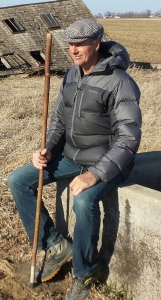Tuesday, April 7, 2015 – Knoke, Iowa
{Reminder: Help celebrate the completion of the Iowa Pipeline Walk with an Earth Day Rally to Stop the Pipeline on Wednesday, April 22 from 5:00-6:00 p.m. at E. Locust and E. 7th in Des Moines.}
{For the latest Iowa Pipeline Walk route and schedule, click here.}
If there is such a thing as a perfect day for walking, today is its opposite. Cold, rainy, windy. At least the first four miles of a 13-mile day are on pavement – a welcome change from the uneven gravel that normally defines my route. The pavement is accommodating. My pace is brisk, and the wind is at my back – for now.
One of the downsides of pavement is realized almost immediately: traffic, especially semis. As the first truck of the day barrels past me, I am blasted by its draft and a cold plume of spray. The experience is a bit like getting hit in the face with a water balloon. I take the sting out of the impact by shielding my face as the truck passes.
There are lots of semis on the highway today. One comes within two feet of me as it hugs the white line. I smell the brakes as it passes, realizing the driver has to slow quickly to avoid not just me but an oncoming vehicle.
Walking in traffic is a reminder that, in the design and planning of America’s transportation system, pedestrians aren’t even an afterthought. I don’t fault the drivers. I wave and smile at each of them. Most wave back. Most give me plenty of room. The unwalkability of America – including most of urban America – is a structural problem. It is a problem of power, both the power of money and the power of the conveyances themselves. In a collision between a pedestrian and a truck on the road or a pedestrian and a highway lobbyist at the Statehouse, the victor is rarely in doubt.
As I near the end of the paved stretch of my route, a truck hauling livestock roars past. This time, perhaps as a parting gift from highway lobbyists, the acrid smell of hog manure blends with the truck’s wet blast of cold air. It’s like being hit in the face with a water balloon . . . filled with hog slurry. I am eager to get back to gravel.
I turn onto a back road that sends me across a stream, and enjoy a moment of comic relief at a sign that reads “No Trespassing Without Permission.”
I walk by two more abandoned farms. Through 4 1/2 miles, I pass six farmsteads, four in various stages of abandonment. Two are inhabited, but in need of significant repair. One is well-kept, with a long driveway up a hill, a statue of Mary standing guard at the top. On this wet day, the driveway seems too long to negotiate, and I leave my flier at the mailbox.
The extent of rural decay weighs heavy upon me. Of the three people I talk with during today’s walk, two speak with sadness about the number of farmhouses that have come down in recent years. Maybe it’s my imagination or the fatigue of walking, but the land itself feels heavy with this sense of abandonment.
The rain falls harder, and I am chagrined to discover that my jeans are wet. I glance down and find three sizable tears in my rain pants. I attempt to minimize the wetness by walking with my gloved hand covering my crotch. I feel some kinship with the teenage boys I’ve seen in Des Moines, holding their crotches as they saunter along. But my comparatively modest stint as a crotch-grabber begins and ends on an empty gravel road in northwest Iowa, and will not likely be played out on a busy street in Des Moines.
The rain stops, the wind dies down, and I am reminded that all hard times pass. Similarly, of course, all good times pass. Buddha instructs his disciples on the path of non-attachment, and Jesus instructs his not to worry about food, clothing or the future. Making this my meditation as I walk, the day’s discomforts fade, and I feel at peace as the wind, cold and rain return with still five miles to go. I remember why I am here, why I walk, why I make this sacrifice of time and comfort.
